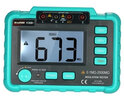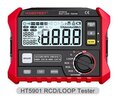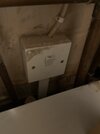This takes me back, around 1990 I returned from the Falklands to Sizewell 'B' in Suffolk, and the 10 years of working abroad had seen the introduction of the RCD.
The safety features were clear, but the lack of switching on the neutral, caused loads of problems working out what had caused the trip. And the idea of 1 amp feeding 300 mA and that feeding 100 mA and that feeding 30 mA was good, but in practice a nail in a portacabin to hang a coat, that hit a cable, still took out them all.
Yes 1 minute delay to no delay should work, but it didn't.
So we have needed to find ways to isolate the fault.

The meter to left was what I returned from Hong Kong with, the idea of measuring current without breaking the supply really helped, but it would only measure in 10 mA increments, I in 2023 finally got the meter to the right, which could measure in 1 mA increments.
I am sure many other electricians were the same, the cost of a meter to measure in 1 mA increments was over £100 until the Chinese made the cheap (£35) option, which could measure AC and DC current, and in the main we relied on the RCD tester.
In theroy we were suppose to test with no load, often rather pointless, if the circuit did not trip at 15 mA then we have 15 mA to spare, so testing with the circuit connected for the non trip, and disconnected for trip current would make sense, however in the real world, it would be tested same for both no trip and trip. So often the commissioning electrician had no idea what the base leakage was.
So it was in real terms, trust to the lord, and we had no idea how much extra leakage would cause the RCD to trip. Some people on this forum tell me their house never tripped, but I know my old house would have a batch of trips, maybe 6 times in 14 days, then 2 years before next trip, and I never did find out why. That is in spite of having insulation testers and RCD testers to hand.
So that house lost two freezers full of food before moving, so this house all RCBO protection, well the three freezers are on to 30 mA RCD sockets, on an UPS supply.
And whole house, has 8 mA leakage, But be it the insulation tester

or RCD tester

we can hardly expect the DIY guy to have access to them. Their only way is to disconnect items, so we look at the likely culprits, outside lights, then outside sockets, followed by anything with mineral insulated heating elements so immersion heaters, ovens, washing machines, dishwashers, and frost free freezers. After that items which use water, central heating, shower units.
Once that fails, then no option but find some one with the test equipment. The test gear shown is the cheapest I could find, and still looking at £150 to buy it, to hire because it needs recalibrating after each hire, around £75, so it seems prudent to use an electrician.
But I would want to disconnect any supply outside, before calling an electrician, as I hate spending money. Yes with the test gear shown I would find the fault, however I have some skill, I would not like to say a DIY person would find the fault.





